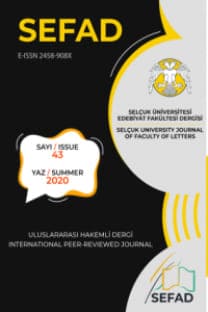MESNEVÎ’DE RAHMET KAPISINI KAPATAN HIRS
Mevlânâ, bütün eserlerinde, özellikle de Mesnevî’de Allah’ın kendisine halife olarak yarattığı insanın bu sıfatı hak edebilmesinin, nefsini terbiye ederek “şirk, küfür, kibir, gazap, kin, zulüm, düşmanlık, hırs, tama, haset, acelecilik” gibi şeytanî vasıflardan kurtulmasıyla mümkün olduğunu örneklerle vurgular. Bir eğitim metodu olarak çoğunlukla vermek istediği mesajı zıddıyla öğretmeyi tercih eden Mevlânâ, insanın yaradılışta kendisine verilen bu değere layık olabilmesi ve meleklere eş mükemmel bir tıynete ulaşması için; “itaat, şükür, alçak gönüllülük, hilm, adalet, sevgi, kanaat, sabır” gibi müspet sıfatlarla donanması gerekliliği üzerinde durarak müspet ve menfi sonuçları da açıkça verir. İnsanın bu müspet sıfatları öne çıkarmasını sağlayacak çarpıcı teşbih ve nasihatlerle, kâmil insan olmasında ve gerçek kulluk şuuruna erişmesinde rehberlik eder. Şüphesiz bu şuura ulaşmayı engelleyecek menfi karakter özelliklerinden biri, belki de en başta geleni “hırs”tır. Mevlânâ, Mesnevî’de bu konuyu “dünya hırsı, mal-mülk hırsı, mevki hırsı, yeme hırsı” gibi çeşitli alt başlıklara dair hikâyeler, teşbihler ve sosyal hayattan örneklerle ele almaktadır. Yazımızda, bu örnekler tespit edilerek, Mevlânâ’nın; insanın bu kötü huydan kurtulabilmesi için sunduğu telkin, ikaz ve öğütlerine dikkat çekmektedir.
GREED IN MATHNAWI AS A CHARACTERISTIC THAT CLOSES THE GATE OF BLESSING
Mawlana (Rumi) emphasises in all of his works, especially in the Mathnawi with examples, that it is possible for humans, whom God created as His caliph, to deserve this title by disciplining the self and getting rid of evil qualities such as “polytheism, blasphemy, conceit, wrath, spite, persecution, enmity, greed, avarice, grudge and haste. Mawlana, who prefers to teach the opposite through its opposite as a teaching method, states that humans should be equipped with favourable qualities such as “obedience, thankfulness, modesty, gentleness, fairness, love, contentment and patience” in order to be worthy of the value granted to them in Creation and acquire a character that is equal to those of angels and clearly demonstrates the positive and negative results. Mawlana guides humans in attaining to be mature people with true awareness of being God’s servants by using striking metaphors and recommendations which will highlight these positive human qualities. “Greed” is naturally one of the most negative character traits or perhaps the foremost one that will prevent attaining this consciousness. Mawlana handles this issue in Mathnawi with stories, metaphors and examples from social life belonging to various subtitles such as “greed for the mundane, greed for property and livestock, and greed to eat”. In our paper, these examples will be determined, and attention will be drawn to the suggestions, warnings and advice that Mawlana offers for humans to get rid of this bad habit.
___
- CANAN, İbrahim (1988), Kütüb-i Sitte Muhtasarı Tercüme ve Şerhi, [18 Cilt], Ankara: Akçağ Yay.
- MEVLÂNÂ CELÂLEDDİN-İ RÛMÎ (1995), Mesnevî, C. I-IV, çev. Veled İzbudak; Gözden geçiren: Abdülbaki Gölpınarlı, 3. baskı, İstanbul: MEB Yay.
- MEVLÂNÂ CELÂLEDDİN-İ RÛMÎ (2000), Mesnevî ve Şerhi, C. I-IV, Şerheden: Abdülbaki Gölpınarlı, 3.baskı, İstanbul: Kültür Bakanlığı Yay.
- ULUDAĞ, Süleyman (1991), Tasavvufî Terimler Sözlüğü, İstanbul: Marifet Yay.
